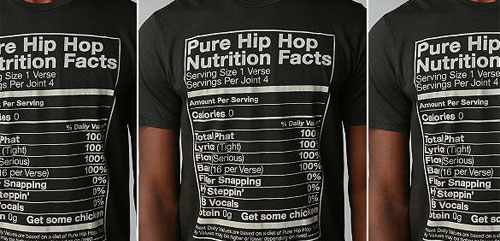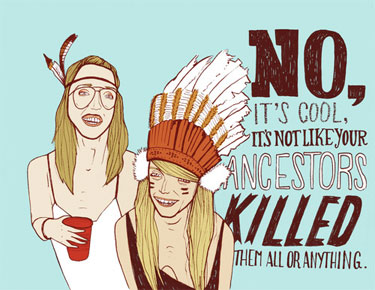In the last couple of weeks or so all over the blogosphere we’ve been discussing millennials with regard to feminism, racism, elitism, nepotism, and all other manner of isms — but one thing has stuck out as of late, and that’s the notion of “ironic racism.” What does this even mean?
Racialicious says it might be something nearing, “acting racist in a way that’s supposed to signal that you know you’re acting racist. And thinking as you do so, that because you’re being ironic, you don’t really mean to be racist, so the racism you’re enacting is okay.”
Blogger s. e. smith goes a bit further and says:
Specifically, the idea is to sound ironic, as in “I’m allowed to say this because of course I’m not racist, so it’s funny.” It’s an aspect of a larger part of the hipster culture, which wants to seem jaded and urbane and oh-so-witty. Using language which is viewed as inflammatory or not appropriate is supposed to push the boundaries and make someone look edgy, but it only really comes across that way to people who buy into that system. To everyone else, it’s just racist.
The assumption then is that it’s okay to agree or laugh, or somehow validate the person making the comment because not to do so would put the listener in the category of being too sensitive, or too “politically correct.” And in the 21st century that is a bad thing, you know, finding something that looks racist, sounds racist, and ostensibly is racist and calling it racist is the er, uncool, unfunny, non-joke getting, part of it all. This sounds a lot like someone insulting you with a straight face, and then when you respond to the insult, immediately saying, “Well, I’m just kidding. I didn’t actually mean to say that your fat ass should take the stairs. How could you have read that as a serious comment?”
Most of the recent firestorm read on The Atlantic Wire and Gawker, and a whole list of other places Vulture has found, has surrounded a response from Lesley Arfin, a writer for HBO’s Girls, about criticism that the show doesn’t depict any non-white characters. Her initial response was to tweet:
“What really bothered me most about Precious was that there was no representation of ME.”
Durr. Yikes. Yeah, not really a bright move to try and combat criticism regarding the lack of diversity on your show, by taking up the mantle of segregationist when your show is said to be an honest and real look at the millennial generation in which studies show have a higher rate of racial tolerance, inclusion, and acceptance.
Let’s be honest here, do we think there are people whether young or old who don’t interact with a diverse group of people outside of certain segments of their lives? Sure. And have there been shows depicting mostly white women where this is showcased? Sure. Sex and the City, another HBO show, case and point. So, no-one’s saying you can’t do what you want with regard to your characters, but when the question comes up, it’s probably better to take your lumps for making your characters a bit less evolved than their millennial counterparts and admit that you’ve drawn their lives not to overlap with the lives of persons of color, than getting defensive, because, yeah, indicating that it was a conscious decision, because this is who these particular girls are, is different than saying, as Arfin went on to say, that she just didn’t give it much thought, which basically proves the critics’ point in that non-whites don’t exist in the world these girls live in, except on the periphery.
But more interestingly, this writer gained more commentary for her tweet than what it was actually about. The notion of “ironic racism” or even “hipster racism” as s.e Smith also refers to it, is not necessarily a new thing. But what we’re finding is a growing amount of acceptance and a possibly stronger foothold among those who perhaps haven’t been acclimated to the world of “political correctness.” Those who were born “Post-PC” if you will. And if so, how does it manifest, what does it look like, and where is the line?
In a discussion on tumblr, commenter sumney, a 21-year-old UCLA student, recounts his feelings on the matter and what he’s experienced.
Examples of ironically racist things that have been said to me: “I would never date an African… everyone from your continent has AIDS.” OR “I bet you disappear in the dark hehe” OR “Dayum that ho has a sexy weave!” Another example is people dressing up as pimps, as ho’s, in blackface, and partying. Remember the Compton Cookout?
Supposedly, ironic racists can’t really be called out for their actions because their response is simple – of course they know what they said was racist, but they didn’t really mean it in a hateful way, so it’s absolutely okay. “What? I’m not racist. Dude, I freakin’ love black people. I volunteer for the NAACP. I voted for Obama. I would never kill a black person my sister’s cousin’s baby daddy is black and we let him come over once – so chill, it’s okay.”
People think ironic racism is equivalent to satire. By making racist jokes – especially sarcastic ones – people think they are pointing out why racism is wrong. But if you are saying racist things without challenging their racist foundations, you have failed at being satirical. Because once you do something racist, your intention/meaning will not always be distinguishable to others who do not live in your brain. Get it? Circulating racism is simply circulating racism.
Often, people tread the line between being ironically racist and just not realizing that they’re being racist or generalizing, and that ambiguity protects their speech: “You can’t play basketball? You’re so whitewashed!” or “You look like a cholo in this picture!” or “Ooooh girl, let’s get some KFC!” When the area gets this grey, how are we supposed to be able to tell the unsupposing racists from the sarcastic f**ks?
Can we blame comedians like Sarah Silverman and Daniel Tosh who both in their stand-up routines have done a version of “Race Does Like This, So This Thing This Race Does is Funny” bit? Is this where it started for the “Post PCers?” Or in our zeal to be able to discuss race in a way that our parents and their parents were unable to do — and thereby trying to reduce the sting, or the awkwardness of those conversations — have we allowed the millennial generation to become completely desensitized or unaware of those harbingers that would incite discordant race debate once upon a time, and like anything else us oldsters discuss, is now so passé that it’s mock worthy?
This surely can’t be the case in all things, since once Arfin felt the sting of her tweet’s response she removed it quickly. So in some way, even if she was recently educated on the matter by a more knowledgeable person, she realized that the comment wasn’t a part of this nebulous notion that says, “Yeah, sure, it’s okay to say something racially charged, and everyone will get it, because you didn’t mean to be racist, or you didn’t know it would be seen that way.”
There may just be a good bit of ignorance that the youth has unearthed when it comes to race and sensitivity that we didn’t realize was evolving. Maybe from the fear of stirring a pot we would like to forget existed, one that is seen to be so ludicrous and absurd that the fact that it hasn’t been eradicated feels like some unwieldy archaic thing, so the answer is to pretend in some fashion that it doesn’t exist, that it can’t really be “a thing” still, right? So jokes are made to reduce the effect, to attempt to deaden the confusion and anger that occurs when it arises.
This is where some of the shock with the recent Trayvon Martin call to action may have came into play. Could it be possible that in a bit of embarrassment, guilt, and shock that we’re still talking about this (or that we haven’t talked about it enough), denial bubbled up, and this is where we heard many a counter-attack which said the race discussions that erupted from the Martin case moved the country back, and was a direct affront to the much heralded post-racial state of the country — and for some that was unacceptable. Nevertheless, this I think is where we get the ironic racism, or the “fun racism.” It’s like the grandchild of the “Don’t talk about Politics, Religion, Gas Prices, Death, or Taxes” mantra. It seems possible within the last generation we’ve added “Race” on the list. But like anything that is still pervasive in our culture, it will find a way out, so now perhaps it shows up in odd places like in Tweets, or bawdy email humor where pooping is called “taking Obama to the White House”, video games, like what’s discussed here about the famous Leeroy Jenkins legend, or even more recently, with this t-shirt sold at Urban Outfitters.

As sumney says, “If a racist (but conscious) person heard your joke – would they stop and think ‘haha – wait, I’m a complete idiot for holding this racist belief that was just joked about.’ Or would they laugh? Would they just laugh, take your joke, and circulate it amongst their circle of racist, privileged friends?” Yes, in this context, it’s an interesting point. Where do you draw the line between a racist “action or thing” and a racist person? We see how it can become muddled.
But before we get too ahead of ourselves, we also don’t want to paint with a broad brush and say that every stupid, idiotic, ignorant, uninformed comment is something so beyond the pale that the person uttering it should forever be labeled a racist. Could this person be the under-exposed or perhaps the “too sheltered?” Perhaps. So, yeah, for those whom this would apply — somebody ring the “teachable moment” bell. But one thing is clear, however you want to slice it, just as there’s no being “a little bit pregnant” so goes the notion that if it’s “a little bit racist” or “ironically racist” it’s still racist. And if you’re falling back on the reasoning of “Well, I didn’t know.” Well, now you do. And just as you would admonish a friend for calling something “retarded” or “gay,” the same should be extended to racially sensitive commentary.
